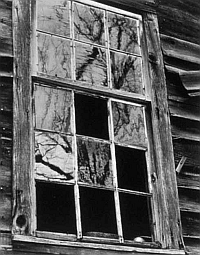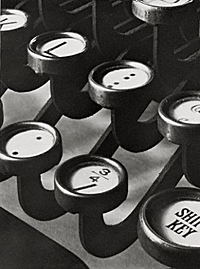 Paul Strand
circ 1916
Some Blogs
|
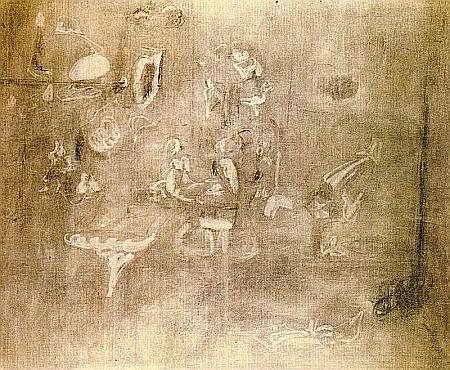
Pastoral
Arshile Gorky
April 15, 1904? - July 21, 1948
_______________________
John Latta on Dos Passos
I think there is such a thing as straight writing. A cabinet maker enjoys cutting a dovetail because he’s a cabinet maker, every type of work has its own vigor inherent in it. The mind of a generation is its speech. A writer makes aspects of that speech enduring by putting them in print. He whittles at the words and phrases of today and makes of them forms to set the mind of tomorrow’s generation. That’s history. A writer who writes straight is the architect of history.
- John Dos Passos
Considering, did William Carlos Williams read Dos Passos? (Another reason to read novelists: possibility that the vigorous beasts’d arrive at things in advance of some of us poor trepidatious and fey poet-types with our comminuted bits of high-preciosity?)...(more)_______________________
Storytelling
Mark Thwaite on Oliver Sacks
The Picador Blog
...he remains (sic) us of the ethical duty to pay attention. Something we can learn when we read him telling the stories of these life-stories. And something we can also learn about when we listen to the stories everyone everywhere has to tell.
_______________________

Ansel Adams
LAPL Photo Database
_______________________
The Prison of “Public Space”
Mark Kingwell
Literary Review of Canada
Public space is the age’s master signifier, a loose and elastic notion variously deployed to defend (or attack) architecture, to decry (or celebrate) civic squares, to promote (or denounce) graffiti artists, skateboarders, jaywalkers, parkour aficionados, pie-in-the-face guerrillas, underground capture-the-flag enthusiasts, flash-mob surveillance busters and other grid-resistant everyday anarchists. It is the unit of choice when it comes to understanding pollution predicting political futures, thinking about citizenship, lauding creativity and worrying about food, water or the environment. It is either rife with corporate creep and visual pollution, or made bleak by intrusive surveillance technology, or both. It is a site of suspicion, stimulation and transaction all at once. For some, it is the basis of public discourse itself, the hardware on which we run reason’s software. Simultaneously everywhere and nowhere, it is political air.
Given the seeming inexhaustibility of the political demand to reclaim public space, what is strange is that nobody admits they have no idea what it is. Most of us assume we know, but more often the assumption is a matter of piety rather than argument—and confused piety at that. Consider the text of a recent open letter to the mayor of Toronto from the Toronto Public Space Committee, an activist group concerned about surveillance cameras: “The proposed police cameras will be surveying public spaces throughout the city. We feel that it is reasonable to assume that law-abiding citizens should be free to walk the streets and enjoy the public spaces without being monitored by the police. The very act of continuous monitoring reduces the freedoms we all value within our public spaces. It puts into jeopardy our rights to privacy, and anonymity, on the streets of our city.”
Even opponents of the surveillance society can see that something has gone wrong in this form of thinking. What, exactly? To find out, I want to raise two rude, basic questions that nobody seems to ask: Is public space actually a public good? And if so, what kind?...(more)
_______________________
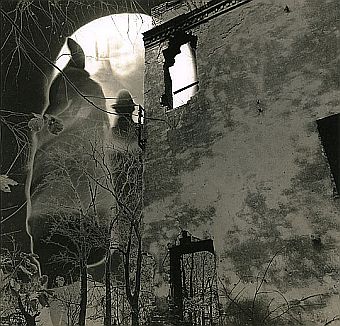
City of Shadows
Alexy Titarenko
via Heading East
_______________________
I am learning what a strange lonely place is myself
reflecting the present reiterating the past
Reconnoitering the future
These are my history
the story of myself
-
Al Purdy from his poem, "Man Without A Country"
quoted in Al Purdy and the Ether of the Sky
by Miguel Strother
_______________________
The Survivor
Tadeusz Rózewicz
(translation: Adam Czerniawski)
I am twenty-four
led to slaughter
I survived.
The following are empty synonyms:
man and beast
love and hate
friend and foe
darkness and light.
The way of killing men and beasts is the same
I've seen it:
truckfuls of chopped-up men
who will not be saved.
Ideas are mere words:
virtue and crime
truth and lies
beauty and ugliness
courage and cowardice.
Virtue and crime weigh the same
I've seen it:
in a man who was both
criminal and virtuous.
I seek a teacher and a master
may he restore my sight hearing and speech
may he again name objects and ideas
may he separate darkness from light.
I am twenty-four
led to slaughter
I survived.
Bill Johnson's translation of Tadeusz Rózewicz
winner of the Polish Found in Translation Award
Three Percentnew poems
Tadeusz Rózewicz
Translated from the Polish by Bill Johnston
Archipelago Books, 2007
Writing the Apocalypse
Voicing Silence Through Time
Rainer J. Hanshe
Hyperion
To be disturbed is to be agitated, to be in a state of turmoil; it is a sign of sensitivity, proof that one feels, that one’s nerves are receptive, for they shudder when overcome by horror, and that is to know the sublime. There is nothing altogether exceptional in this, it is natural one might protest, but man is no longer natural, far from it, and sensitivity of Rózewicz’ order is rare in an era in which most humans have become anesthetized and are insensate to horror, if, at all, they are even cognizant of it. To be remotely aware of the horrors of the world is one matter, but to live with or be disturbed by them is yet another. What most of humanity prefers is the serenity and harmony of the beautiful. Few live with history as Rózewicz does and even fewer tremble before it continuously. From new poems, it is apparent that history is a regular presence in his life, one which, like a specter, haunts his memory and prods him into thought, and this is the poetry of one engaged in rigorous thought. When writing of the traumas of history though, they are not merely ‘past events,’ but living currents experienced again and again, evidence of ‘history’ as an ever present presence in consciousness. Time’s borders, as is well known, are amorphous....(more)
.....................................................
review by Elizabeth Wadell
The Quarterly Conversation
review by Ron Slate
Tadeusz Rózewicz Poems
_______________________
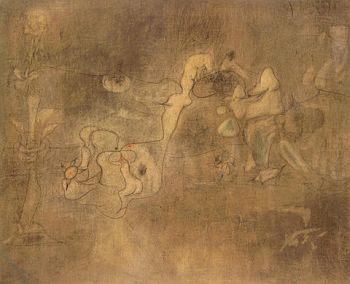
The Plow and the Song
Arshile Gorky
1946
_______________________
Players
Edwin Booth and the nineteenth-century American stage
Leslie Stainton
Common-place
April 2008
I heard the spring wind whisper
Above the brushwood fire,
"The world is made forever
Of transport and desire.Bliss Carman, Earth Voices
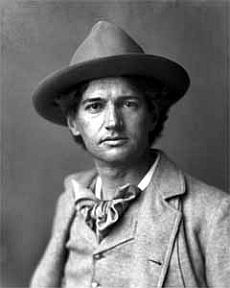
Bliss Carman
April 15, 1861 - June 8, 1929 .
_______________________
Elections in America: Millionaires Accusing Each Other of Elitism
Brad Reed
Why is our millionaire pundit class so gosh-darned interested in finding allegedly "genuine" ruling-class politicians to champion as tried'n'true representatives of Real America? Without subjecting them to intense psychological treatment (not a half-bad idea), I have no way of knowing. But I do know that this seems to be a uniquely American phenomenon in the industrialized world.
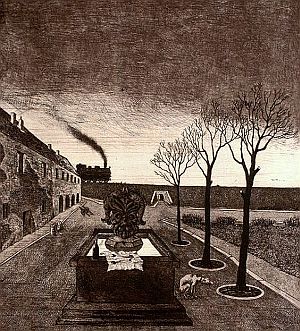 morning
Jindrich Pilecek
_______________________
The Dead Poet
Al Purdy
1918-2000
I was altered in the placenta
by the dead brother before me
who built a place in the womb
knowing I was coming:
he wrote words on the walls of flesh
painting a woman inside a woman
whispering a faint lullaby
that sings in my blind heart still
The others were lumberjacks
backwoods wrestlers and farmers
their women were meek and mild
nothing of them survives
but an image inside an image
of a cookstove and the kettle boiling
- how else explain myself to myself
where does the song come from?
Now on my wanderings:
at the Alhambra's lyric dazzle
where the Moors built stone poems
a wan white face peering out
- and the shadow in Plato's cave
remembers the small dead one
- at Samarkand in pale blue light
the words came slowly from him
- I recall the music of blood
on the Street of the Silversmiths
Sleep softly spirit of earth
as the days and nights join hands
when everything becomes one thing
wait softly brother
but do not expect it to happen
that great whoop announcing resurrection
expect only a small whisper
of birds nesting and green things growing
and a brief saying of them
and know where the words came from
_______________________
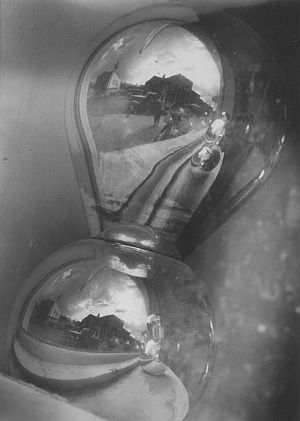
Lost in time
Clarence John Laughlin
_______________________
"Olympic Voices from China"
Words Without Borders
As the world looks to Beijing and the 2008 Olympics, we present a national women’s team of writers to guide us through the richly sedimented and often contradictory layers of the current Chinese psyche.
.....................................................
Chinese Feminisms and Adaptation-as-Translation
Readings of Letter from an Unknown Woman
Jinhua Li
... the complex cultural and political issues engendered by an increasingly popular phenomenon of transnational film adaptations. Through a comparative reading of Jinglei Xu's 2004 adaptation of Stefan Zweig's novella Brief einer Unbekannten (Letter From an Unknown Woman), Jinhua Li argues that the adaptation-as-translation approach, as a valuable theoretical model for feminist cultural studies of Eastern-Western dynamics, allows the film to be read not only as a "translated/adapted" literary discourse that functions on different narrative levels, but also as a trope for the reimagination of gender politics in China and the reinscription of Chinese feminism.
CLCWeb: Comparative Literature and Culture
_______________________
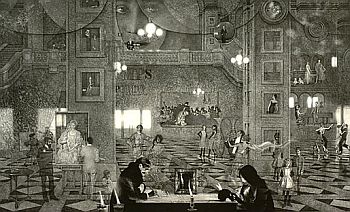
In Search of Lost Time
Peter Milton
_______________________
The future of book nostalgia
David Weinberger
Anthony Grafton's New Yorker article on why libraries will always be with us shows the blinding power of book nostalgia.
_______________________
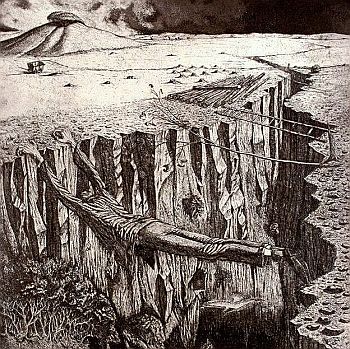
Jindrich Pilecek
1944 - 2002
_______________________
In Bluebeard's Castle
Somes Notes Towards the Redefinition of Culture
George Steiner
complete text
3. In a Post-Culture
... The confident center is, I think, unrecapturable. Rome n'est plus dans Rome.
Lost also, I would judge -- or at least, decisively damaged -- is the axiom of progress, the assumption, dynamic in its self-evidence, that the curve of Western history was ascendant. Doubtless, there were challenges to this presupposition. I have pointed before to a kind of counterclockwise motion of myth, to the widely held intimations, part theological, part romantic-pastoral, of a lapsed paradise and golden age. But even at their most poignant, these Arcadias did not refute a dominant sense of gain. To an astonishing degree, general feeling suppressed even such dramatic monitions of ultimate ruin as were put forward by the study of entropy and heat-death from the 1820s on. The desolate vision of "eternal return," of all history as gyre and déjà-vu, as we find it in Nietzsche and in Yeats remained an eccentric nightmare. Common sense held otherwise: although there were bound to be temporary setbacks, agonizing detours, and blind alleys, although the arrow might, at times, seem to fly with enigmatic slowness, history was moving forward. Socially, intellectually, in respect of resources and vistas, civilized man was on the march. Indeed, the steadiness of his tread distinguished him from the inertia, from the myth-enclosed stasis of the "savage." (Only poetry and the fine arts, as Marx noted, seemed to offer a teasing anomaly, having long ago attained a pitch of mastery perhaps unequaled, and surely unsurpassed, since.) So far as the major agencies of history went, progress was not a dogma but a simple matter of observation. In this conviction Hegel and Marx were at one. So also were Darwin and Samuel Smiles, whose epochal and curiously parallel books, Origin of Species and Self-Help, appeared in the same month in 1859, at the noon point of a confident era.
Not much of that axiomatic presumption (for it was that) is left to us. The Kierkegaardian concept of "total possibility," of a fabric of reality open at all points to the rift of absurdity and disaster, has become a commonplace. We are back in a politics of torture and of hostages. Public and private violence laps at the foundations of the city, mining, making an acid mark, as does the brown water in Venice. Our threshold of apprehension has been formidably lowered. When the first reports of the death camps were smuggled out of Poland, they were largely disbelieved: such things could not be taking place in civilized Europe, in the mid-twentieth century. Today, it is difficult to conjecture a bestiality, a lunacy of oppression or sudden devastation, which would not be credible, which would not soon be located in the order of facts. Morally, psychologically, it is a terrible thing to be so unastonished. Inevitably, the new realism conspires with what is, or should be, least acceptable in reality....(more)
_______________________
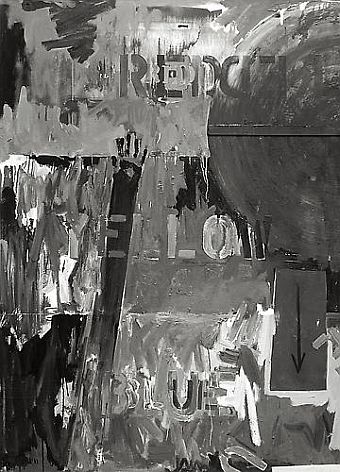
Land's End
Rudolph Burckhardt
Jasper Johns - Black and White
Photographs Of Paintings 1955-1969
By Rudy Burckhardt And Others
via gmtPlus9 (-15)
_______________________
"No one experiences pleasure like one who is convalescing. His delights are not orgiastic in nature: the flow of his renewed blood resonates with the murmur of streams, the purer breath from his lips with winds in the tree tops. [There is a] childlike nobility for those who have escaped from the depths of night and madness, the madness, namely, of myth."
--
Walter Benjamin
courtesy of The Cloisters
_______________________
New equipment in place and lessons slowly being learned about the relationship between computer dependency and meat-ware memory after the collapse of my hard drive - mw
.....................................................

receding floodwaters
photo - mw

photo - mw
_______________________
Psalm
George Oppen
In the small beauty of the forest
The wild deer bedding down --
That they are there!
Their eyes
Effortless, the soft lips
Nuzzle and the alien small teeth
Tear at the grass
The roots of it
Dangle from their mouths
Scattering earth in the strange woods.
They who are there.
Their paths
Nibbled thru the fields, the leaves that shade them
Hang in the distances
Of sun
The small nouns
Crying faith
In this in which the wild deer
Startle, and stare out.
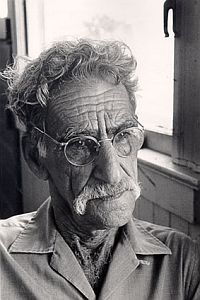 George Oppen
1908 - 1984
Photographer: Michael West
Oppen at 100
myth of the blaze
Al Filreis on George Oppen
The knife at the end of the poem is perfectly opaque: the knife of the lamb – merely to butter one’s daily abundant American? Or the sharp killing knife-likeness of the war, the war-like imagination.
George Oppen at 100 bespeaks the reason to – and also the reason not to – affirm the reality of the political act outside the poem. The best thing about the problem is that, here, it is inside it, as follows:
I believe
in the world
because it is
Or:
I believe
in the world
because it is
impossible.
...(more)
_______________________
MiPOesias May 2008
_______________________
Molar Machines and the Psychology of Bureaucrats
larvalsubjects on The Bullshit of the Academy
_______________________
Seeing Voices
Hannah Weiner's Open House
Edited by Patrick Durgin
reviewed by Joyelle McSweeney
_______________________

photo - mw
_______________________
from
Nocturne Militaire
Thomas McGrath
Now in the east the dark, like many waters,
Moves, and uptown, in the high hotels, those few
Late guests move through their remembered places
But their steps are curiously uncertain, like a sick man’s
or a sleepwalker’s. Down the beach, in rooms designed for their masters,
The soldiers curse and sing in the early blackout.
Their voices nameless but full of fear or courage
Ring like calm bells through their terrible electric idyll.
They are the nameless poor who have been marching
Out of the dark, to that possible moment when history
Crosses the tracks of our time. They do not see it approaching,
But their faces are strange with a wild and unnoticed mystery.
And now at the Casino the dancing is nice and no one
Notices the hunchback weeping among the bankers,
Or sees, like the eye of an angel, offshore, the burning tanker,
As the night patrol of bombers climbs through the rain and is gone. ...(more)
_______________________
 spring flood
photo - mw
_______________________
The End of History, which is the Corporate global slogan, is not a prophecy, but an order to wipe out the past and what it has bequeathed everywhere. The market requires every consumer and employee to be massively alone in the present.
-
John Berger
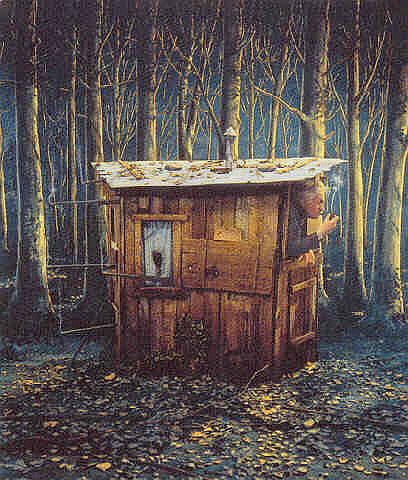 Teun Hocks 1 2 _______________________
Oh the stories I could tell you if I were easy. What a rabble in my head, what a gallery of moribunds. Murphy, Watt, Yerk, Mercier and all the others. I would never have believed that - yes, I believe it willingly. Stories, stories. I have not yet been able to tell them. I shall not be able to tell this one.
- Molloy, Part II
_______________________
Our theories about the world are deeply emotional, to us. Voiced idea is character.
The Brain Is The Ultimate Storytelling Machine, And Consciousness Is The Ultimate Story
Richard Powers the believer
Story is the mind’s way of molding a seeming whole from out of the messiness of the distributed, modular brain. At the same time, shared stories are the only way anyone has for escaping the straightjacket of self. Good medicine has always depended on listening to histories. So any attempt to comprehend the injured mind naturally inclines toward all the devices of classic storytelling. Neurological case histories exist in a hybrid place between descriptive science and reflective art, a halfway place much like the narrated self’s.
....
Estrangement seems to have become the baseline condition for life in terrorized America. After November 2000, after September 2001, after the Patriot Act and the detainee bill, after Gitmo and Abu Ghraib, our stories—public and private—keep scrambling to keep America whole, continuous, and coherent, to place it. The basic outline of life here still looks familiar. But for a lot of people, the place no longer feels recognizable.
It seems to me that evil—the word of the hour, again—might be the willful destruction of empathy. Evil is the refusal to see oneself in others.
I truly don’t know what role the novelist can play in a time of rising self-righteousness and escalating evil. Any story novelists create to reflect life accurately will now have to be improvised, provisional, and bewildered. But I do know that when I read a particularly moving and achieved work of fiction, I feel myself succumbing to all kinds of contagious rearrangement. Only inhabiting another’s story can deliver us from certainty.....(more)
_______________________
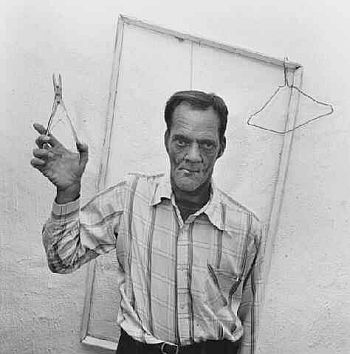 handyman
Roger Ballen 1 2
_______________________
Major technical difficulties will keep posting here sporatic untill I adjust to new equipment after the dreaded (unrecoverable) hard drive failure - mw
_______________________
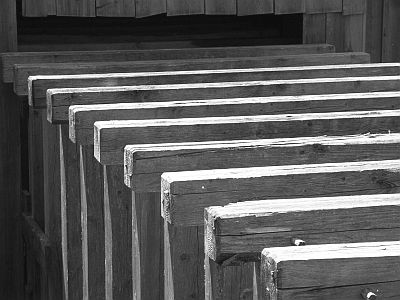 photo - mw
_______________________
fizzle 3
Afar a bird
Ruinstrewn land, he has trodden it all
night long, I gave up, hugging the hedges,
between road and ditch, on the scant grass,
little slow steps, no sound, stopping ever and
again, every ten steps say, little wary steps, to
catch his breath, then listen, ruinstrewn land, I
gave up before birth, it is not possible other-
wise, but birth there had to be, it was he, I was
inside, now he stops again, for the hundredth
time that night say, that gives the distance
one, it's the last, hunched over his stick, I'm
inside, it was he who wailed, he who saw the
light, I didn't wail, I didn't see the light, one on
top of the other the hands weigh on the stick,
the head weighs on the hands, he has caught
his breath, he can listen now, the trunk
horizontal, the legs asprawl, sagging at the
knees, same old coat, the stiffened tails stick
up behind, day dawns, he has only to raise his
eyes, open his eyes, raise his eyes, he merges
in the hedge, afar a bird, a moment past he
grasps and is fled, it was he had a life, I didn't
have a life, a life not worth having, because of
me, it's impossible I should have a mind and I
have one, someone divines me, divines us,
that's what he's come to, come to in the end, I
see him in my mind, there divining us, hands
and head a little heap, the hours pass, he is
still, he seeks a voice for me, it's impossible I
should have a voice and I have none, he'll find
one for me, ill beseeming me, it will meet the
need, his need, but no more of him, that
image, the little heap of hands and head, the
trunk horizontal, the jutting elbows, the eyes
closed and the face rigid listening, the eyes
hidden and the whole face hidden, that image
and no more, never changing, ruinstrewn land,
night recedes, he is fled, I'm inside, he'll do
himself to death, because of me, I'll live it with
him, I'll live his death, the end of his life and
then his death, step by step, in the present,
how he'll go about it, it's impossible I should
know, I'll know, step by step, it's he will die, I
won't die, there will be nothing of him left but
bones, I'll be inside, nothing but a little grit, I'll
be inside, it is not possible otherwise,
ruinstrewn land, he is fled through the hedge,
no more stopping now, he will never say I,
because of me, he won't speak to anyone, no
one will speak to him, he won't speak to
himself, there is nothing left in his head, I'll
feed it all it needs, all it needs to end, to say I
no more, to open its mouth no more, confu-
sion of memory and lament, of loved ones and
impossible youth, clutching the stick in the
middle he stumbles bowed over the fields, a
life of my own I tried, in vain, never any but
his, worth nothing, because of me, he said it
wasn't one, it was, still is, the same, I'm still
inside, the same, I'll put faces in his head,
names, places, churn them all up together, all
he needs to end, phantoms to flee, last phan-
toms to flee and to pursue, he'll confuse his
mother with whores, his father with a road-
man named Balfe, I'll feed him an old curdog,
a mangy old curdog, that he may love again, lose again,
ruinstrewn land, little panic steps
-- Samuel Beckett, translated by the author
_______________________
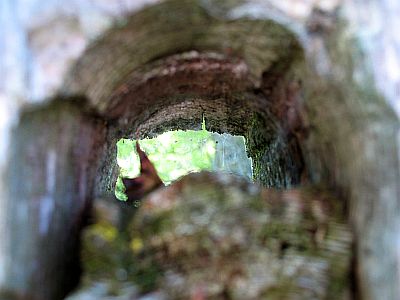 photo - mw
 Reading "Quotations of Chairman Mao" on the train
Xiao Zhuang
1966
Photography from China
1934-2008
Lens Culture previews
FotoFest's Citywide Exhibitions
Houston, Texas
March 7 - April 20, 2008
______________________________________
Everyday Jacket
Sam Sacks looks at Richard Price and Lush Life
Open Letters Monthly
Insisting that writers turn their backs on the hanging fruit of DreamWorks and United Artists is like preaching abstinence to high schoolers or pacifism to presidents, and the crux in this case is purely financial. An upper-list novelist, if he’s lucky, might take in something like $40,000 for a book that required one to eight years of difficult composition. A screen adaptation—even an original screenplay—rarely takes six months to create and will garner from big studios something in the ballpark of $500,000.
Since there’s no arguing with these figures, many writers have become contortionists with their creative time, apportioning certain months to lucrative hackwork and rationing the remains for artistic endeavors. If, to the pure-minded, the approach seems so pragmatic as to be antithetical to artistry (the pure-minded might forget such things as mortgages and car insurance, but bill collectors never do), it finds some justification in the work of Richard Price, who, perhaps more successfully than any current novelist, has been able to divide his time between both worlds and uphold, in his own words, a “separation of church and state.” ... (more)
______________________________________
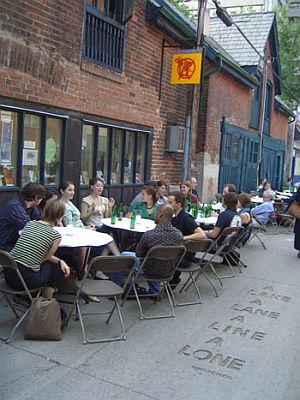 bp nichol's poem in pavement
Coach House Books
Photo credit: Rick/Simon
bpNichol.ca
is nothing but a history
brief at best
an end of one thing
beginning of another
premonition of a future time or line we will be writing
— bpNichol, The Martyrology Books I and II
After years of planning we are pleased to launch bpNichol.ca, an online public archive of the works of bpNichol and his collaborators. Here you will find audio, digitized print materials, photographs, links and eventually video, critical articles and curated exhibitions.
bpNichol at PennSoundand UbuWeb Sound
First Screening (computer poems)
bpNichol
1984
______________________________________
Our ancestors wrote prose in long, beautiful sentences, convoluted like curls; although we still learn to do it that way in school, we write in short sentences that cut more quickly to the heart of the matter; and no one in the world can free his thinking from the manner in which his time wears the cloak of language. Thus no man can know to what extent he actually means what he writes and in writing, it is far less that people twist words than it is that words twist people.Robert Musil, 'The Paintspreader',
in Posthumous Papers of a Living Author, p. 67
courtesy of an eudæmonist
______________________________________
Saint Charles Crumb
Spurious
A new category: Saints, short for saints of the everyday. Those who never moved out of the family home, who got lost in their own rooms and never left them again. Lost - in inner space. Lost in the ruin of the life they might have had: what horror! What glory, too -... (more)
______________________________________
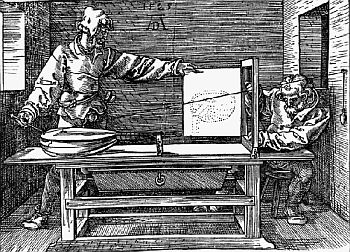 Early mechanical creation of an image
1525
Albrecht Dürer
21 May 1471 - 6 April 1528
______________________________________
The U.S. establishment media in a nutshell
Glenn Greenwald
In the past two weeks, the following events transpired. A Department of Justice memo, authored by John Yoo, was released which authorized torture and presidential lawbreaking. It was revealed that the Bush administration declared the Fourth Amendment of the Bill of Rights to be inapplicable to "domestic military operations" within the U.S. The U.S. Attorney General appears to have fabricated a key event leading to the 9/11 attacks and made patently false statements about surveillance laws and related lawsuits. Barack Obama went bowling in Pennsylvania and had a low score.(...)
Every day, it becomes more difficult to blame George Bush, Dick Cheney and comrades for their seven years (and counting) of crimes, corruption and destruction of our political values. Think about it this way: if you were a high government official and watched as -- all in a couple of weeks time -- it is revealed, right out in the open, that you suspended the Fourth Amendment, authorized torture, proclaimed yourself empowered to break the law, and sent the nation's top law enforcement officer to lie blatantly about how and why the 9/11 attacks happened so that you could acquire still more unchecked spying power and get rid of lawsuits that would expose what you did, and the political press in this country basically ignored all of that and blathered on about Obama's bowling score and how he eats chocolate, wouldn't you also conclude that you could do anything you want, without limits, and know there will be no consequences? What would be the incentive to stop doing all of that?... (more)via mosses from an old manse
______________________________________
Was Killing Iraqi Children Worth It?
Jacob G. Hornberger
UN Ambassador Madeleine Albright, upon being asked whether the deaths of half-a-million Iraqi from the sanctions were worth it, she replied that yes - they were "worth it." She was expressing the sentiment of the U.S. government, a sentiment that manifested itself again in the bombing of the compound in which those Iraqi children and their families were killed.
Now, ask yourself: Why has the U.S. government been occupying Iraq for the past 5 years? Didn't they already "get" Saddam? Hasn't he already been executed?
The answer is that U.S. officials, having "gotten" Saddam must now "get" the "bad guys" in Iraq. And who are the "bad guys?" They're the Iraqis who are angry over the killing of Iraqis, including women and children, who had to be killed in the process of "getting Saddam."... (more)
______________________________________
A new book from the editor of The Revealer
The Family: The Secret Fundamentalism at the Heart of American Power
Jeff Sharlet
amazon link
"Of all the important studies of the American right, The Family is undoubtedly the most eloquent. It is also quite possibly the most terrifying. This story of a secretive and unmerciful church of "key men" goes way beyond Jesus Christ, CEO—it's Jesus Christ, lobbyist; Jesus Christ, strikebreaker; and maybe even Jesus Christ, fuhrer."
-- Thomas Frank, author of What's the Matter with Kansas? From the jacket
The Family is about the other half of American fundamentalist power—not its angry masses, but its sophisticated elites. Sharlet follows the story back to Abraham Vereide, an immigrant preacher who in 1935 organized a small group of businessmen sympathetic to European fascism, fusing the Far Right with his own polite but authoritarian faith. From that core, Vereide built an international network of fundamentalists who spoke the language of establishment power, a “family” that thrives to this day. In public, they host prayer breakfasts; in private they preach a gospel of “biblical capitalism,” military might, and American empire. Citing Hitler, Lenin, and Mao, Doug Coe, the Family’s current leader, declares, “We work with power where we can, build new power where we can’t.”
Sharlet’s discoveries dramatically challenge conventional wisdom about American fundamentalism, revealing its crucial role in the unraveling of the New Deal, the waging of the Cold War, and the no-holds-barred economics of globalization. The question Sharlet believes we must ask is not “What do fundamentalists want?” but “What have they already done?”
______________________________________
 Le papier peint
Antonio Clavé
b. 5 April 1913
______________________________________
Contact [PDF]
Alphonso Lingis
Janus Head
When someone there is standing before us, we have been cautioned that he is not speaking with his own voice but speaking the language of his gender, his family, his class, his education, his culture, his economic and political interests, his unconscious drives, indeed his state of physical health and alertness. Are we then doing no more than interpreting what he says and does? Do we ever make contact with what he means for himself when he says “I”—with his visions, the story he tells himself of his life?
What an extraordinary power, this power of the voice to put us in contact, not with our own mental images but with persons and things themselves!
We catch on to the purring of the kitten, the frantic cries of the bird, the snorting of the distrustful horse, the complaint of the caged puma. We pick up the tone of the blackbird marsh, the hamlet meditating in the Himalayan mountainscape, the shifting dunes under twilight skies. As our words form, the tone of these things and events resounds in our voice. The pacing and accents of our phrases express the calm or the frenetic movement, the rhythm and periodicity or jerks and explosions of the things and events. Our words articulate the agitated tone of a column of ants, the syncopation of the dockworkers unloading a ship, the purple majesty of the Pacific ocean under dawning Madagascar skies. Our words reverberate the tone of a cave, a cathedral, a dance, the pacing, the rhythms, the expanse, they return the muffled or dead silence. ______________________________________
SET still
stop thinking
shut up, &
get OUT
& down
& listen
to the voices
formulas & anamneses
(not the biographical sublime
urban & local (non urbis & ruris
historical & magical
at the Interchange of Tinctures.
 SET
[PDF]
Cover by Harry Martin
Edited and published by Gerrit Lansing, 1961 Robert Duncan, Charles Olson, Stephen Jonas,
Edward Dorn, John McGavern, Robert Kelly,
John Wieners, Frater Perdurabo, Gerrit Lansing. SET 2
[pdf]
1963.
from
The Exchanges II
Robert Kelly
SET
There is in language a temerament of fear
to answer the animal is to talk about syllables
pure as a lake in Siberia
salty & rush-ridden centuries from the sea
to which a river flows backwards Chrismas night
or gull's hornpipe lowly to the cross in deep snow
when they hanged the first king: whose strangled throat
made consonants
in the forests vowels
invented with the caprice of the unicorn,
goat-eyed red-bottomed mandrills at horizons,
perpetual song of lemurs: ururur, syllables,
Aurora bloody-fisted from the Caspian lake,
erect
the Madman's Vision a vision into
image or into form?
Adam's allergy to the first bite retched into speech?
 Cement Factory
Bernd Kleinheisterkamp via
______________________________________
oasis
Barbara Mor
All moist life is inside now. Dark oases of banks, hotels,
restaurants, avid hearts. Valves open, glass doors sluice
heavily inward all hours day and night vegetal interiors
-- we are consumers. Sudden biologic air light water.
Tendrils of machinery alleviate the body, green plants florescent
liquids circuitries of oxygen nutrients through skins of semi-
human buildings, tubes wires electric cells inside walls
pump what is left of earth from a deep place into our
veins. From the ice of mental systems into our final
thoughts
... (more)
Oasis 2
Barbara Mor
Dona Mona a mythical person who lives in CalleReina behind
the tacqueria next to the alley that leads to the electrical power
station beyond which trains rattle night&day on nervous
tracks that make earth a junkie. her shack(xacalli)invisible
among many,a tiny garden inside adobe walls rusted grillwork
enclosing dependent on the days chemicals PeruvianAndes
Brazilian jungle the shitty barrio where one lives&dies simply
whitewashed bone w/one red geranium in her eyesocket the air
is green cockroach sweat a reign of splendor behind the retinas
daily
en su casa,she is occupied. windows boarded up except
one door nice slants of yellow heat thru pine slats no shadows
no cooking or eating either,no running water (there is a pump
outside if a dog comes to drink it lives but humans die)she
busies herself in serious ways,roaches&scorpions inhabit the
walls 1000 years for a reason stink&poison like otras mujeres
weave blankets&spider webs around their dark corners she
concentrates & the ancient dust enters&departs its fabulous
shapes (people, flowers, tigers pyramids gods) sometimes at
such speed only a blur w/a broom as if sweeping everything
existent awry or her several eyes glow in the dark watching
nothing or she appears sitting straitback cruel wooden chair
in midst of bare sala stares at flickering b/w tv screen hour
upon hour her soaps & religious programs (the brain attracts
hemispheric events) or past midnite she monkeys w/contrast
dials until a black screen w/white fosforos vectors zigzags
flash news & these are transmissions lloros espectral from
freeways or other cities, thoughts, nations in other episodes
she is doing bad things on other planets no one knows
anything about zip nada... (more)
the secret pornographies of republicans
Barbara Mor
Sea of Hunger
Barbara Mor
Here
a small history of a mining town in the American southwest
(Warren/Bisbee AZ 1985)
Barbara Mor
______________________________________
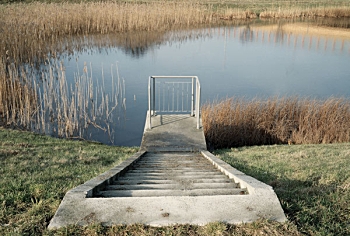 Maciek Stepinski via Mrs. Deane
______________________________________
Viability
H Saussy
Printculture
You couldn't have said that a project, a war plan, a business or a child was “viable” before 1537, and even at that, only in French. People would have looked at you askance and corrected you: surely you meant some other word: vif, vivace, vivable (vivid, vivacious, livable), etc. And the first person to use the word probably did so by mistake, or gropingly, feeling that the French word “vivace” didn't quite render the meaning of the Italian word “vivace” in the passage he was trying to translate: “Et pourtant il advient souvent que les homes sont moins viables que les dames” / “spesso interviene che sono meno vivaci che esse” / “it frequently happens that men are not as long-lived as women.”
Readers who thrill to this kind of information are invited to read on. (...)
“Viability,” seen through the several shifts in its four-hundred-and-seventy-one-year history, draws and redraws the uneasy frontier between life and “mere life,” between the social and the biological, between the survival of the species and the residual idea of the human that others, deemed viable in their time, have bequeathed to us under the name of “the humanities.”... (more)
______________________________________
 Brasil
Bernd Kleinheisterkamp
______________________________________
Experiment, for me, is not a formal tic, some avant-garde glaze or fashionista look. It is a processual question of writing some thinking into the page in the medium of language.
A visionary practice of cultural critiquea superb interview with Rachel Blau DuPlessis
... desires to change culture and politics often get mapped onto languages and conventions that already exist. This, sometimes, for the sake of "efficiency" or even "communicability." Like the joke about socialist realism-instead of boy meets girl, it's boy meets tractor. But some structure of feeling remains-"boy meets…" hasn't changed; the romance hasn't changed. Just the object has changed. This kind of syncretism is both powerful and absorptive (like Catholicism assimilating pagan and polytheistic holidays and materials), but it may mean that fundamental structures of genre, language, convention are not destabilized or restructured but just undergo point-for-point substitution. That's why a person can't assume that political radicalism means or implies literary radicalism. They are separable goals. (Whole books have been written about this! Often, in the current climate, by Language- inflected poets!)... (more)
______________________________________
Polyhedron
Robert Fernandez
Our binary heritage does not turn anachronistically, but skillfully through watersheds of fear. Laughter credits us with binary code the color of olives, soil the color of olives. Possession and transformation take place over months or in the time it takes to eat a meal. Tissue threaded across certain occupations: military, police, prison, illness. Compassion trims the moon until it is unseen.(...)
the day undoes its belts and we have seen
what others have not necessarily wanted to see:
the shells, intricately folded,
of hunger
angel
of history:
a rhesus,
like Brando in an aspirin tree
Hart Crane surfacing,
wrapped in a Haitian flag ... (more)
______________________________________
Rage Fatigue, Plastic Dirt and Happy Hour in America
The Audacity of Depression
Joe Bageant
I am not kidding when I say rage fatigue victims have fallen into an ongoing mid-level depression. (Looks to me like the whole country has, but then I'm no mental health expert.) The less depressed victims can be found lurking near the edges of the Obama cult, consoling themselves that a soothing and/or charismatic orator is better than nothing. Obama may yet be borne through the White House portico by a Democratic host of seraphim, but he cannot do much without the consent of a bought and paid for Congress. Only George Bush can do that, and we can only hope God broke the mold after he made George. And like whoever else wins the presidency, Obama can never acknowledge any significant truth, such as that the nation is waaaaay beyond being just broke, and is even a net debtor nation to Mexico, or that the greatest touch-me-not in the U.S. political flower garden, the "American lifestyle," is toast. But then, we really do not expect political truth, but rather entertainment in a system where, as Frank Zappa said, politics is merely "the entertainment branch of industry."... (more)
______________________________________
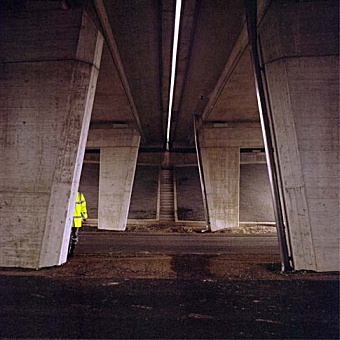 Maciek Stepinski ______________________________________
The mob within the heart
Police cannot suppress
The riot given at the first
Is authorized as peace
Uncertified of scene
Or signified of sound
But growing like a hurricane
In a congenial ground
- Emily Dickinson
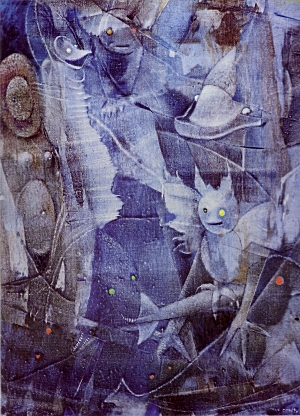 the illustrious forger of dreams
Max Ernst
April 2, 1891 - April 1, 1976 large scans at Giornale Nuovo 1 2 3 4
______________________________________
The war is language,
language abused
for Advertisement,
language used
like magic for power on the planet
- Allen Ginsberg, Wichita Vortex Sutra
______________________________________
The Liberal Defense of Murder
a crucial account of the emergence of the "pro-war left," and its shaping of our post-9/11 world.
Lenin’s Tomb______________________________________
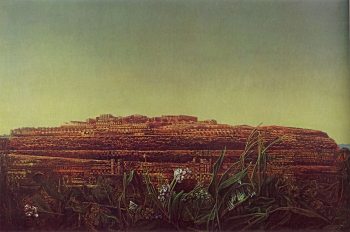 the city entire
Max Ernst
______________________________________
Canzone
for Marilyn Hacker
George Szirtes
Somewhere there is a perfect architecture
where light, form, shadow, space all move
to form a language beyond architecture,
where to dream of the wrong architecture
is to dream of dying. But waking bans
the dream and reinvents the architecture
of the empty day that is all architecture
and no dream. Is there somewhere a culprit
we might blame for this, and is the culprit
ourselves? We make our own architecture
and live in it as in a house of ill fame,
it being all we desire of fame.
(...)
Self is an architecture that must move
in order to accommodate. No self bans
movement because it knows that to move
is to survive. Heart must beat, blood move
around the building. To live is to be a culprit.
And then another enters with a neat move
slick as a poem that is obliged to move
the heart, which is all a self can know of fame,
bestowing fame through accommodation. Fame
at last is words like these, constantly on the move
turning the building into architecture
or simply calling the building architecture.
I touch the miraculous architecture
of your face feeling its own solitary fame
knowing myself both self and culprit.
Something inside the word rebels, bans
conversation. It’s language on the move.
.....................................................................
Unfixed City
Anna T. Szabó reviews Budapest: Image, Poem, Filmby George Szirtes and Clarissa Upchurchhungarian quarterly
______________________________________
Repetition: Kierkegaard, Artaud, Pollock and the theatre of the image.
Samuel Weber with Terry Smith
It might seem odd to go to a text on repetition when discussing questions of the image. However, as soon as you start to realise that the image is not something inert, something once and for all, that, on the contrary, it implies some type of temporal process in its production, reception, and circulation, then a temporal category such as repetition is not in principle as alien or as strange to it as it might seem were you to regard an image as something absolutely self-contained, instantaneous, as purely spatial.(...)
... resurgence of interest in repetition is accompanied by a renewed concern with theatricality. Theatricality is not quite the same as theatre, it doesn't have to be identified with actual theatrical productions and institutions. So from the point of view of the history of art, we might ask what the rethinking of theatricality has to do with the reinterpreting of images
______________________________________
Kierkegaard's Repetition as a Comedy in Two Acts
Stuart Dalton
janus head
______________________________________
 immaculate conception
Max Ermst ______________________________________
The torrent
Todd Gitlin
open democracy
...for all the talk, and all the talk about the talk, the main truth about the media slips through our fingers. Critics and commentators miss the immensity of the experience of media, the sheer quantity of attention paid, the devotions and rituals that absorb our time and resources. Riding the torrent, they don’t see it as a torrent and instead talk and argue about the splashes and the spray. The obvious but hard-to-grasp truth is that living with the media is today one of the main things human beings do.... (more)
Signals Of Saturation
An exchange with Todd Gitlin, the author of Media Unlimited: How the Torrent of Images and Sounds Overwhelms Our Lives atlantic
We flatter ourselves when we conjure an "information society"—the term's a tribute our nervous system pays to our rationality. Even when we collect information, we feel—feel excited, sad, frightened, bored, tickled, masterful, all sorts of things. As image- and sound-consumers, we feel and aim to feel—shallowly, for the most part. (...)
Much as we fancy ourselves rational choosers—well, at least lots of academics and media professionals do—we spend much of our lives feeling ready to yield to the next feeling, each demanding little of us but that we sit at the ready, remote-control or Walkman in hand, finger poised at the radio scan button, looking for the next new thing, or at least the next next thing. (...)
We can't stand outside the torrent. I can't, anyway. Irony is one way to cope. ... (more)
 sugar bush
sap lines
photo - mw ______________________________________
Notes To 'The Book Of Supplemental Diagrams' For Marco Knauff's Universe,
Vol. 1: "Principal Features."
Translated from the Dutch by Norman Lock
Diagram
1.
The Machinery is all, is habitation, is dreaming and exile.
The Blue Wire is essential to its construction.
And the Diode ringed with the colors of technology.
The Capsule contains an element yet to be identified.
(We suspect magic. We suspect a small beneficence.)
Now open the window. The air will further the enterprise, which, we insist, is a noble one. The light, which clings to the surfaces of leaves and grass, is also good.
Do not fear rust or the illness of time. The design has taken them into account.
In a corner of the room, install a bed in which you may, according to the time of day and your desire, lie down to sleep or take pleasure.
Night is best suited to desire.
2.
Night is a precinct of the Machinery. It belongs to the visible Universe, although what occurs there is hidden from view.
Night is indicated in the Diagrams by an Ellipsis […], that is to say: a passage in which you may hide.
(From here on, "Ellipsis" is understood to mean "night.")
We love night and also fear it. ... (more)
______________________________________
Censorship Today: Violence, or
Ecology as a New Opium for the Masses
Slavoj Zizek
part 1
part 2
______________________________________
Walter Benjamin and the Virtual: Politics, Art, and Mediation in the Age of Global Culture
Transformations
via Continental Philosophy
______________________________________
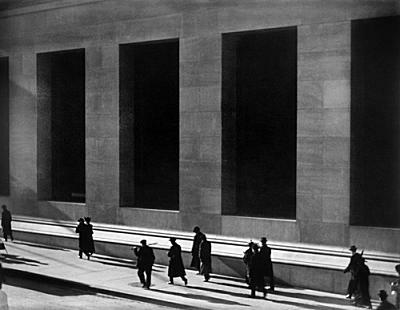 Wall Street
Paul Strand
1915
______________________________________
Sandlines: Mea culpa – Can It Liberate?
Edward B. Rackley
3quarksdaily
And your silence is all to no avail; today the blinding sun of torture is at its zenith; it lights up the whole country. Under that merciless glare, there is not a laugh that does not ring false, not a face that is not painted to hide fear or anger, not a single action that does not betray our disgust, and our complicity.
-- Sartre, Preface to Fanon's The Wretched Of The Earth
As the election year approaches, I find myself fantasizing about a very different political consciousness in this country. A state of mind where the majority of voters are appalled, outraged and shamed by our military practices and outcomes in Iraq, Afghanistan and Guantanamo. Ashamed and outraged enough to mobilize in direct opposition to a geopolitical strategy that is digging our national grave by the day. To mobilize not just by voting for change next year, but acting now with concrete gestures of rejection and refusal powerful enough to bring the calculus driving this mad debacle to a shuddering, definitive halt. ... (more)
______________________________________
A Library Lamp
Richard J. Cox reviews Alberto Manguel's The Library at Night
Reading Archives
______________________________________
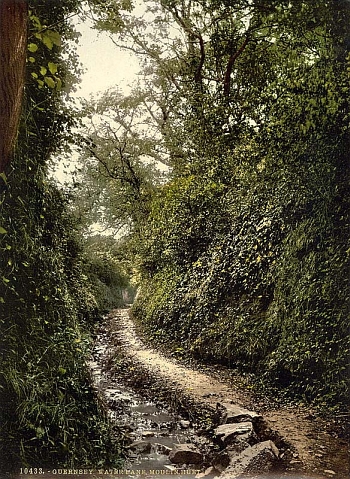 water lane
Guernsey
Old Photos
United Kingdom of Great Britain and The British Isles.
|































